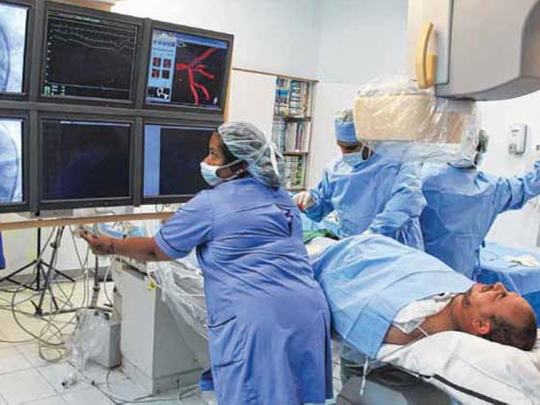
Abu Dhabi: Despite a shortage of registered nurses across the world, concerns such as low job satisfaction and lack of career opportunities continue to plague the sector in the UAE.
A study conducted across six public hospitals in the northern emirates last year found that nurses were also unhappy with their pay scales and benefits, delegates at the Abu Dhabi Medical Congress 2012 heard in the capital on Monday.
Health care representatives working closely with nurses said any improvement in these factors would greatly increase nurse retention and recruitment opportunities.
“As part of the study, I surveyed nearly 720 nurses working at Ministry of Health hospitals, and found that many felt dissatisfied because they could not contribute to research,” Bilal Al Salibi, senior nursing tutor at the Institute of Nursing in Fujairah, told Gulf News.
“In addition, many nurses currently hold diplomas in nursing, which does not provide them with enough know-how to conduct research. Therefore, allowing nurses to pursue further education and undertake research would not only improve their levels of job satisfaction but also have a positive impact on the level of patient care they provide,” he added.
According to research conducted in 2008, the UAE has as few as 29.1 nurses per 10,000 people.
Al Salibi’s study, undertaken in 2011, also found that registered nurses working in public hospital neonatal departments reported the greatest level of satisfaction.
‘Positive sign’
“In general, most nurses were happy with their peers and working relationships with their physicians, so this is definitely a positive sign,” the nursing tutor said.
The study has already been presented to the Ministry of Health for further analysis and action.
Al Salibi’s research did not look at job satisfaction among registered nurses in the emirate of Abu Dhabi, but Hiraina McKenzie, staff support specialist for the positive environment programme at the Tawam Hospital in Al Ain, said similar trends prevail in Abu Dhabi as well.
“At our hospital, we have an employee assistance programme that allows health care workers to express their professional concerns,” McKenzie said. The goal is to provide short-term stress relief for them. The majority of people who make use of these services are registered nurses, and a great many of them are looking for career development and research opportunities,” McKenzie added.
McKenzie also said that although nurses were satisfied with their pay scales and benefits in Abu Dhabi, she had found that many did require support in working with staff from other cultural backgrounds.
“While most expat nurses study the needs of Emirati patients adequately before moving to the UAE, they are often unable to work well with other expat nurses,” she said.
Difficult to recruit
A combination of these factors means that the majority of registered nurses choose not to renew their employment contracts once they expire.
It is also particularly difficult to recruit Emirati nurses, McKenzie said.
According to 2011 statistics released by the Health Authority Abu Dhabi, there are currently about 193 licensed Emirati nurses in Abu Dhabi emirate.
“There is a global shortage of nurses, so all countries are fighting over a limited pool. This is why it is especially important to resolve their concerns,” the support specialist urged.












